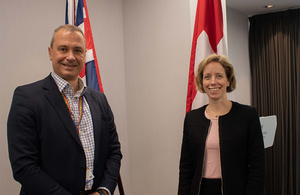- Research led by OHID finds 40% of first-time mums introduced solid food before their babies are 5 months old
- NHS official advice recommends solid food should be introduced around 6 months alongside breast milk or formula
- New campaign backed by Dr Zoe Williams and nutritionist Charlotte Stirling-Reed aims to promote NHS advice and bring awareness of resources to support first time mums
Parents will be better supported to safely introduce their children to solid food following the launch of a new campaign from the Office for Health Improvement and Disparities (OHID).
Weaning is a key milestone within the first 1,001 critical days, influencing children’s eating habits and their health later in life and improving babies abilities to move food around their mouth, chew and swallow.
The campaign will promote NHS advice on weaning and tackle confusion around how to introduce solid foods. The official NHS guidance recommends solid foods should be gradually introduced from around six months – alongside breast milk or infant formula.
If a baby is showing these three signs, it means they’re ready for weaning:
- Stay in a sitting position, holding their head steady
- Coordinate their eyes, hands and mouth so they can look at food, pick it up and put it in their mouth
- Swallow food, rather than push it back out By around 6 months of age, infants are usually developmentally ready to accept foods other than breast (or infant formula) milk.
The introduction of solid foods or infant formula before 6 months can reduce the amount of breast milk consumed and is associated with greater risks of infectious illness in infants. Giving solid foods to breastfed infants before six months may also reduce breast milk intake without increasing total energy intake or increasing weight gain.
The campaign comes as new research by OHID found 40% of first-time mums introduced solid food by the time their baby is five months old, earlier than the NHS recommendation of around six months, and almost two-thirds (64%) say they have received conflicting advice on what age to start weaning.
Health Minister, Maria Caulfield, said:
The first 1,001 days are crucial for development and impact a child’s health for the rest of their life.
Every child should have a solid foundation on which to build their health and I am determined to level up the opportunities and support for all children, no matter their background or where they grow up.
This campaign will ensure parents have the support and confidence to introduce their babies to solid food and ensure they have the opportunity to thrive and achieve their full potential.
The campaign includes an online Start for Life Weaning Hub featuring tips, advice guidelines from the NHS all in one place for ease to better support parents and reduce confusion and is backed by experts, including GP Dr Zoe Williams and nutritionist and author Charlotte Stirling-Reed.
The Start for Life Weaning hub also contains over 120 healthy and easy to prepare recipes and meal ideas which cover every step of the weaning journey, such as blueberry porridge and fish curry.
With more than 1 in 4 (27.7%) children being overweight when they reach school age, the Better Health Start for Life Weaning campaign will play a crucial role in supporting parents to get their child’s diet right at the earliest stage, encouraging healthy food variety and developing good food habits.
More widely, the government remains committed to improving babies’ and children’s healthy development through the £500 million package to provide support for parents and children, as well as continuing to implement the recommendations from Andrea Leadsom’s Early Years Review to promote best practice across the health system and ensure babies and children can get the best possible start
Charlotte Stirling Reed, Registered Nutritionist, Association for Nutrition said:
I know lots of parents may feel nervous and overwhelmed at the thought of introducing their baby to solid foods, but this research just goes to show you’re not alone. The Start for Life weaning hub is a great tool to make parents feel confident about how to wean their baby. It’s so important to teach little ones about food in a fun and relaxed manner as we want them to grow up enjoying mealtimes, so the weaning hub is designed to help parents enjoy this milestone by having lots of helpful advice all in one place.
Dr Zoe Williams, GP and TV Doctor said:
The research released today confirms that with so much conflicting advice available, weaning can be a very confusing time for parents. That’s why it’s so important to have all the information and NHS advice in one place. For most healthy babies, the easiest way to cut through the confusion is to wait until your baby is around six months old – this gives them time to develop properly, so they can cope with solid foods. When you do eventually start, there will be days when your baby eats more, some when they eat less, and then days when they reject everything! Don’t worry – this is perfectly normal.
Vicky Sibson, First Steps Nutrition Trust said:
The introduction of solids is an important and exciting milestone for babies, which can have lasting impacts on their dietary habits and health. To get it right, their parents/carers need information and advice that is practical and independent. For that reason we are pleased to support Better Health – Start for Life’s new ‘introducing solids’ campaign.
Mum of eight month old baby Rex said:
We started weaning Rex just after he was six months and at the beginning we didn’t know where to start! My friend pointed me in the direction of the Start for Life weaning hub, and it was a godsend. Everything was so clear and easy to understand. As busy parents, we all need some extra help and inspiration from time to time, so we particularly loved the meal ideas and found the recipes really easy to make. We also loved documenting all the funny faces Rex would pull when discovering new foods!
- For more information on weaning
- Assets for the campaign
- The research is based on a survey carried out on 1,000 parents with children aged 3-18 months and found:
- Three in five (59%) first-time parents found the decision to start weaning confusing
- Almost two-thirds (64%) have received conflicting advice on what age to start introducing solid food
- 40% of first-time mums introduced solid food by the time their baby is five months old
- After partners, grandmothers are the biggest influence on decision making with over a quarter (28%) of first-time mums reporting their mother had the biggest influence on their decision to start weaning
- The majority (74%) agree there should be one official source for weaning advice
- As part of the wider commitment to better support new parents, the government is investing £50 million in breastfeeding support services. This funding forms part of £300 million investment in Start for Life and Family Hub services
- Data on children being overweight or living with obesity when they reach school age is available from NHSD

